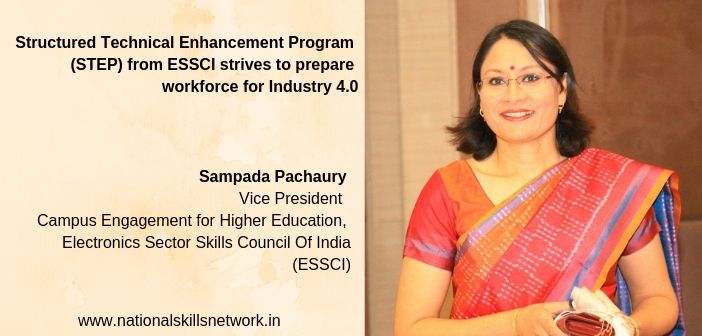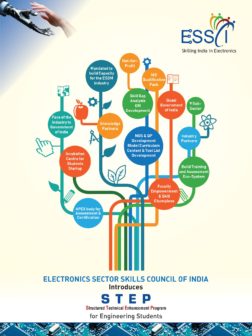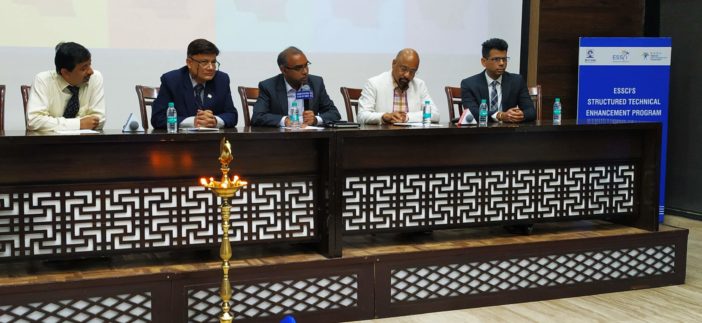Structured Technical Enhancement Program (STEP) from Electronics Sector Skills Council Of India (ESSCI) is a major step in aligning the engineering college curriculum with industry requirements. In this Skill Talk, Sampada Pachaury, Vice President – Campus Engagement for Higher Education, Electronics Sector Skills Council Of India takes us through the details of the program and tells us how this strategic intervention can transform the industry with demand-driven training, a win-win-win for the students, the academia and the industry. Let’s read on..
What are some challenges faced by the Electronics industry in terms of skills and other parameters?
The period of 2010’s saw some drastic changes in the Electronics industry. The most productive and effective workforce band was thinning. The newer entrants were not able to match up to the rapidly growing needs of the technological competency. Statistically more engineering graduates sought placement in IT over their home branch due to assured placements and wider choice of trainings available for further growth in career.
While Electronics industry in India has successfully served the IP development needs for multinational establishments, very little indigenous designs from India have seen the global market space. Technology is an integral part of socioeconomic backdrop today and lack of technically competent core electronic engineers is the biggest deterrent to its growth.
 How is ESSCI addressing these issues?
How is ESSCI addressing these issues?
The ESSCI has skilled 8 lakh youth in India for manufacturing and service industries. Based on the 2017 data from National Skill Development Council (NSDC), this segment represents nearly 49% of the skilled resource requirement. The higher end skilled resource requirement is low volume but crucial to Make in India. If done right, this small fraction of core engineers can turn around the in-house product design landscape of the country. ESSCI has developed a Structured Technical Enhancement Program – STEP. The aim is to create a capable workforce of Industry 4.0 ready professionals. Solutions developed on Indigenous technology for low cost, high volume and globally competitive market through local start-ups will serve the issues of unemployable electronics engineers and help retain electronics graduates to electronics industry
How does STEP bring the industry and the academia closer?
STEP is a strategic intervention in the Engineering education. It is crafted with the objective to develop a sustainable ecosystem inside the Colleges and close the widening gap between existing academic curriculum and industry. STEP brings industry-aligned training to the students complementing the learning with focus on lab assignments and case studies. These training programs are based on Qualification Pack adhering to National Standards Qualification Framework (NSQF).
 Project Based Learning (PBL) pedagogy is being adopted to engage students with a deeper understanding of their subject Structured Technical Enhancement Program works on students from 1st year until the completion of their higher education. It provides a jumpstart to the students to keep them moving ahead in their careers
Project Based Learning (PBL) pedagogy is being adopted to engage students with a deeper understanding of their subject Structured Technical Enhancement Program works on students from 1st year until the completion of their higher education. It provides a jumpstart to the students to keep them moving ahead in their careers
During 4 years of STEP, students go through a systematic progression of trainings/short term internships and intermediate assessments. These assessments provide a direction to students towards specialized skill trainings as per latest technology occupation map. STEP is a live program run by Industry based Trainers and training modules.
Besides making students employable, STEP also stimulates them as innovators and product developers. It strengthens their technical fundamentals . It provides them the key skill sets required not only to enter the industry but to grow in their profession lifelong.
The students receive counseling under an industry person’s guidance and supervision. The faculty also raises their level of knowledge to impart that to their students. It is up to the campus to nominate the faculty and incentivize them for the extra effort they have to put in for this.

How do you engage the faculty through this scheme? What are the advantage for them?
The ecosystem cannot be established without engaging the faculty. Faculty Development Programs are much needed to aid STEP trainings within campus. Faculty today is well equipped with teaching methods but that solves only 50% of the problem. Just as much as an Industry leader is only 50% equipped to educate students. A collaboration of faculty with industry is the only way to take knowledge, learning and expertise to students. Faculty can participate in this program actively to become Skill Champions. Then can be our next generation of trainers. If campus permits, the faculty can cater not only to their college, but also to a cluster of local colleges.
How will STEP benefit the student?
After the students complete the intense STEP training and Final assessment, they get a Certificate stamped by National Skill Development Council – NSDC and Electronics Sector Skill Council if India – ESSCI in addition to their Engineering Degree. This certificate has national relevance and it validates their skilling status for a specific Job Description. This certificate guarantees their eligibility towards relevant industry placement.
Additionally, we are collaborating with a lot of industries to accept students undergoing STEP for Internships during the concluding semester of engineering degree. This gives the students an opportunity to prove themselves, create a value and earn an offer within the same industry.
- Students avail mentoring and soft skill trainings to assist them in placement.
- Students with an aptitude as innovators get just the right guidance and mentoring to go from incubation to Start-Ups through STEP eco-system.
- Students aiming higher education and grow as Research Fellows also benefit. STEP supports partly/fully sponsored Ph.D admissions through national and international alliances
How is STEP imparting holistic skills to the students?
STEP students are exposed to Industry trainings and Design Competitions/Contests from the start. They continuously engage in live industry projects. Apart from helping them to understand expectation of the industry, the process enables them to hear, learn and talk the language spoken in the multinational corporate. The process pushes them to hone their spoken and written communication skills.
They learn to present and showcase their work effectively and correctly. Students learn the nuances of innovative product development and optimum usage of resources given to them. They imbibe enterprising mindset. This prepares them not only as Entrepreneurs but also makes them more aware employees of an organization. The Lab work is mostly a collective work of a couple of students, sometimes requiring inter-disciplinary approach. This prepares them to work as teams in a project and put their best foot forward while working on their weak areas
The Learning Management System or automated Web Portal provides access to scores of video libraries. Students learn soft skills and practice for interviews, presentations and other relevant skills required for self-mastery. It’s a platform available to the student through the tenure. It has unlimited access and so the student can self-help at his convenience.
How would you describe the role of STEP and ESCCI in the spaces of skill development and employability?
Industry Occupation and Employability Map to serve the Technology demands of the coming decade requires skills rooted in learning and innovation. Technology is driving economies of states and good quality of living. Academia is not equipped to match the fast paced industry training needs. A lot of work has been done in the past decade to solve this crisis. Ironically none of the ways adopted by industry or institutions lasted beyond seminars/webinars and captive laboratories set up by agencies.
ESSCI takes skill development to a new level where the results will be driven by quality and not quantity. ESSCI’s goal is to partner with selective institutes and capture only few thousand students and few hundred faculties in the first phase.
STEP provides end to end solutions. It works with institutions, faculty members and students. It engages industries and agencies in effective collaboration.
It brings live industry trainings to Institutes and it takes STEP trained students to industries for internships and placements. STEP truly acts as a 2-way bridge between Academia and Industry













Comments 2